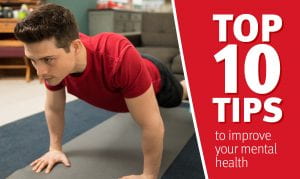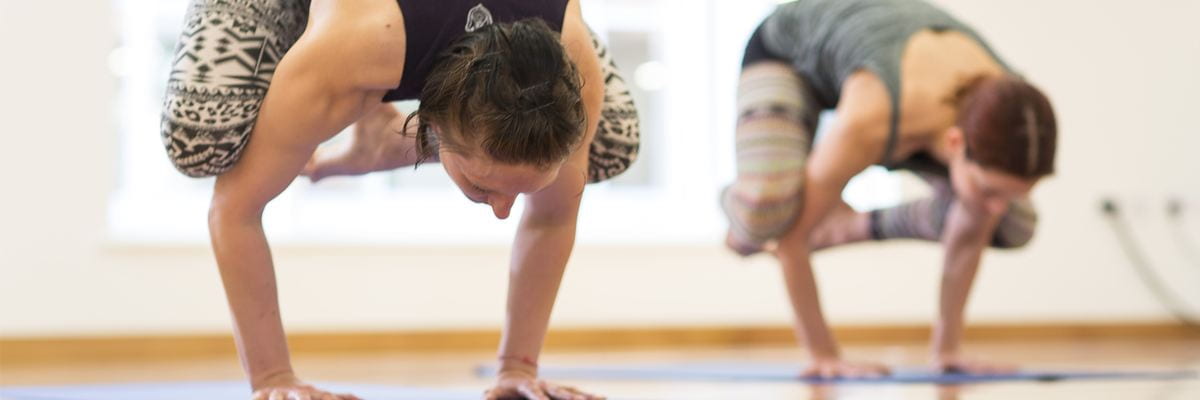A year into the pandemic, CitySport in London has opened its doors again. Whether you can join a gym, go outside, or still feel safest at home, CitySport’s Leisure Supervisor (Fitness) Viktoria Faltusz gives us tips on how to feel stronger. It’s not all about the physical strength, Viktoria has some great suggestions on how to take care of our mental health too.
 Viktoria, if we feel we want to do some more exercise, what are your suggestions?
Viktoria, if we feel we want to do some more exercise, what are your suggestions?
The best approach is step-by-step. Gradually increase the intensity and frequency of the training sessions. When you are thinking about the type of physical activities, you don`t have to go crazy; gardening, dog walking, walking and cycling to work, hiking, or simply just taking the stairs instead of the lift can contribute towards your overall wellbeing. The key is consistency. You have to build this into your daily routine and allocate time for it. NHS has really good guidance and information, you can look up their 12-week exercise plan or the Couch to 5k running plan.
If you are going back to the gym, start with the elliptic trainer, rower, stepper and bikes. then slowly add resistance machines and weights to your exercise routine. At CitySport you can book a gym induction if you’ve lost your confidence and need guidance on using the equipment or to help with your exercise routine. To be physically active is vital nowadays. A new major study has shown that regular exercise reduces the chances of dying from infectious diseases such as Covid-19 by more than a third and makes people 31% less likely to catch the virus. As recommended by NHS people need to be doing 30 minutes a day, five days a week, or 150 minutes a week of exercise that gets you at least slightly out of breath.
What if we have lost a bit of body confidence, and feel uncomfortable working out in public?
You have to remember that everyone is in the same shoes and will have similar questions or concerns regarding their body image. Luckily, the message has shifted and changed these days, and the focus is more on being healthy again (both physically and mentally) through regular exercise, and it is not all about losing weight or burning fat or building muscles. You only have to do what feels good to you!
What has it been like to manage a gym that isn’t open?
 Lockdown has been hard for the CitySport team too. The majority of our team was on furlough, and the remaining staff members were trying to plan for our return and for the new normal. We adapted well to the digital era and came up with social media activities for our members on YouTube, Facebook and Instagram (@citysportec1). We launched our online class timetable, hosted a few LIVE interviews and workouts, and joined worldwide campaigns like LGBT History Month, and International Women’s Day.
Lockdown has been hard for the CitySport team too. The majority of our team was on furlough, and the remaining staff members were trying to plan for our return and for the new normal. We adapted well to the digital era and came up with social media activities for our members on YouTube, Facebook and Instagram (@citysportec1). We launched our online class timetable, hosted a few LIVE interviews and workouts, and joined worldwide campaigns like LGBT History Month, and International Women’s Day.
CitySport’s wide variety of exercise videos are still available for free on Youtube. If you can’t get to the gym, or prefer working out from home, check them out!
CitySport is open to alumni as well as students, staff, and members of the public. If you’d like to join the gym again, visit the website for the latest information.
 What about our mental health? Below are Viktoria’s and CitySport’s 10 tips on how to not only exercise your body, but help keep your mind healthy as well:
What about our mental health? Below are Viktoria’s and CitySport’s 10 tips on how to not only exercise your body, but help keep your mind healthy as well:
 Plan. Have a to-do list and write down your daily tasks in order of importance. This will put your schedule into perspective and help you consider what is a priority.
Plan. Have a to-do list and write down your daily tasks in order of importance. This will put your schedule into perspective and help you consider what is a priority.
 Talk. Talk to friends or family or join a support group. Do not suffer in silence. Connect with those around you.
Talk. Talk to friends or family or join a support group. Do not suffer in silence. Connect with those around you.
 Read. Reading books benefits both your physical and mental health. Results of a study showed that those who read books lived around two years longer than those who either didn’t read at all or read magazines and other forms of media.
Read. Reading books benefits both your physical and mental health. Results of a study showed that those who read books lived around two years longer than those who either didn’t read at all or read magazines and other forms of media.
 Learn. A new hobby can be a great stress reliever and it can help you break out of ordinary behaviour patterns. Learning new skills can provide something to think about other than daily worries. It can also help to boost your CV.
Learn. A new hobby can be a great stress reliever and it can help you break out of ordinary behaviour patterns. Learning new skills can provide something to think about other than daily worries. It can also help to boost your CV.
 Try to stay positive. Our thoughts affect the way that we feel. Take time to think of the positive things in your life and things that you are thankful for.
Try to stay positive. Our thoughts affect the way that we feel. Take time to think of the positive things in your life and things that you are thankful for.
 Stretch. It can help increase your flexibility which is an important factor of fitness, improve your posture, reduce stress and reduce body aches. You can find stretching exercises on CitySport’s YouTube channel.
Stretch. It can help increase your flexibility which is an important factor of fitness, improve your posture, reduce stress and reduce body aches. You can find stretching exercises on CitySport’s YouTube channel.
 Breathe. It may feel unnatural to breathe deeply but the practice comes with various benefits. Deep breaths are more efficient and allow your body to fully exchange incoming oxygen with outgoing carbon dioxide. They have also been shown to slow the heartbeat, lower or stabilize blood pressure, lower stress and help you relax.
Breathe. It may feel unnatural to breathe deeply but the practice comes with various benefits. Deep breaths are more efficient and allow your body to fully exchange incoming oxygen with outgoing carbon dioxide. They have also been shown to slow the heartbeat, lower or stabilize blood pressure, lower stress and help you relax.
 Listen to music. Music can help to improve your mood, decrease pain and anxiety and facilitate opportunities for emotional expression. Think about what music you can listen to when you exercise, when you are home or if you want to lift your mood.
Listen to music. Music can help to improve your mood, decrease pain and anxiety and facilitate opportunities for emotional expression. Think about what music you can listen to when you exercise, when you are home or if you want to lift your mood.
 Keep hydrated. Drinking enough water and staying hydrated is the first rule of health and nutrition. The NHS recommends consuming six to eight glasses or cups of water a day.
Keep hydrated. Drinking enough water and staying hydrated is the first rule of health and nutrition. The NHS recommends consuming six to eight glasses or cups of water a day.
 Exercise. Daily activity will improve your mood, health and general mobility. Getting yourself moving can enhance overall wellbeing and reduce the risk of developing depression and anxiety.
Exercise. Daily activity will improve your mood, health and general mobility. Getting yourself moving can enhance overall wellbeing and reduce the risk of developing depression and anxiety.
Thank you, Viktoria for all these tips!
